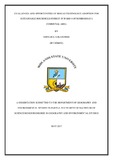Please use this identifier to cite or link to this item:
https://cris.library.msu.ac.zw//handle/11408/2654Full metadata record
| DC Field | Value | Language |
|---|---|---|
| dc.contributor.author | Sakarombe, Shingirai | - |
| dc.date.accessioned | 2017-07-14T12:12:41Z | - |
| dc.date.available | 2017-07-14T12:12:41Z | - |
| dc.date.issued | 2017 | - |
| dc.identifier.uri | http://hdl.handle.net/11408/2654 | - |
| dc.description.abstract | The research sought to comprehensively examine challenges and opportunities of biogas technology adoption for sustainable household energy in rural areas of Zimbabwe. Focus was on Domboshava Communal Area, Ward 4 where potential of the technology is hundred folds higher than the present status. The research adopted both qualitative and quantitative research techniques to answer the objectives. Total enumerative sampling technique (census) was used and 56 biogas adopters within the study area were sampled. In addition, purposive sampling technique was employed to select key informants from EMA, SNV, ZERA, Environment Africa and the Ward Councillor. Questionnaires, key informant interviews and observations were used to collect data in the field. Collected data was analysed using Statistical Package for Social Sciences and Microsoft Excel and then presented in frequency distribution tables, graphs and pie charts. Despite a notable positive attitude towards biogas technology, results of the research revealed a worrying lack of technology awareness in Ward 4 of Domboshava Communal Area. The research further revealed that factors like employment status and level of education attained do not influence biogas adoption while funds availability, awareness, promoters and gender of the household head were seen to have a major effect. The research concluded that lack of adequate knowledge about the technology and lack of required resources are the main constraints inhibiting biogas technology adoption by households in Ward 4. This is despite various potential opportunities such as high nutrient content organic fertiliser, reduced time spend on firewood collection and reduced in-house air pollution being enjoyed by the adopters. The study recommends the Ministry of Energy and Power Development to embark on massive education and awareness campaign in rural areas, provide loans and subsidies, provide accessible technical services and set up demonstration centres in every ward with a view of encouraging rural households to adopt biogas technology. | en_US |
| dc.language.iso | en | en_US |
| dc.publisher | Midlands State University | en_US |
| dc.subject | Biogas technology | en_US |
| dc.subject | Sustainable household energy | en_US |
| dc.subject | Rural areas | en_US |
| dc.title | Challenges and opportunities of biogas technology adoption for sustainable household energy in ward 4 of Domboshava communal area | en_US |
| item.languageiso639-1 | en | - |
| item.fulltext | With Fulltext | - |
| item.grantfulltext | open | - |
| Appears in Collections: | Bsc Geography And Environmental Studies Honours Degree | |
Files in This Item:
| File | Description | Size | Format | |
|---|---|---|---|---|
| First Final Dissertation.pdf | 1.63 MB | Adobe PDF |  View/Open |
Page view(s)
254
checked on Jan 29, 2026
Download(s)
164
checked on Jan 29, 2026
Google ScholarTM
Check
Items in MSUIR are protected by copyright, with all rights reserved, unless otherwise indicated.



